If you love having nice squash fresh from your garden, then companion plants for summer squash can make a real difference. Some plants will help to ensure that your squash flowers get pollinated, while others can repel or even act as ‘trap plants’ for the pests that might otherwise decimate your squash. It really just boils down to finding the right plants to give your summer squash a few advantages that it wouldn’t have on its own and then letting Nature work her magic.
If you haven’t tried companion planting, then today is your lucky day. We’re going to share 15 of the best companion plants for summer squash and also 5 ‘pitfall plants’ that you’ll want to keep far away from it. By the time we’re done, you’ll be ready to do a little companion planting on your own and come harvest time, you’ll be a firm believer in the advantages to this gardening strategy.
Without further ado, let’s explore the best (and some of the worst) companion plants for summer squash and don’t worry – we’ve got a little something for everyone!
Table of Contents
Best Companion plants for summer squashes
In this section, we’ve compiled a list of the best companion plants for summer squashes so that you can see what each of these plants brings to the table and try companion planting on your own. To ensure that you’ve got a good variety of choices, we’ll be dividing these entries up into 3 categories:
- Kitchen and medicinal herbs
- Healthy veggies and delicious fruits
- Ornamental additions
For each plant, we’ll tell you a little about what makes them a good companion, as well as their soil and sunlight preferences to help you get started. After that, we’ll also into some bad companion options to help you avoid these pitfall plants. With that said, let’s get this show started!
Kitchen and medicinal herbs
1. Dill
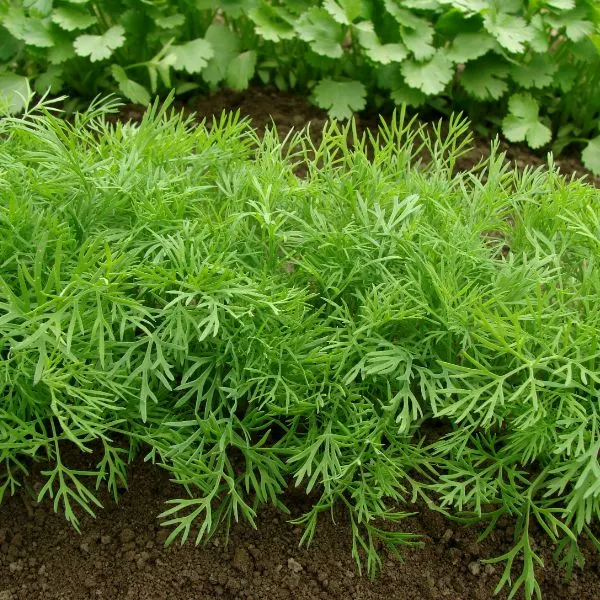
- Botanical name: Anethum graveolens
- Sun Requirements: Full sun
- Soil Type: Well-drained, slightly acid soil
A favorite in the kitchen and also an ingredient in many commercial and homemade soaps, dill makes an excellent addition to your garden and can be the best of buddies with your summer squash, too! When planted close to squash, dill can attract both bees and butterflies to help with pollination, and wasps also seem to love the scent and can help to take care of a lot of pests that are trying to feast on your squash.
Dill will also repel a number of pests and notably, squash bugs don’t seem to like it at all. This makes dill a great companion planting choice that will really work well with your summer squash!
2. Peppermint
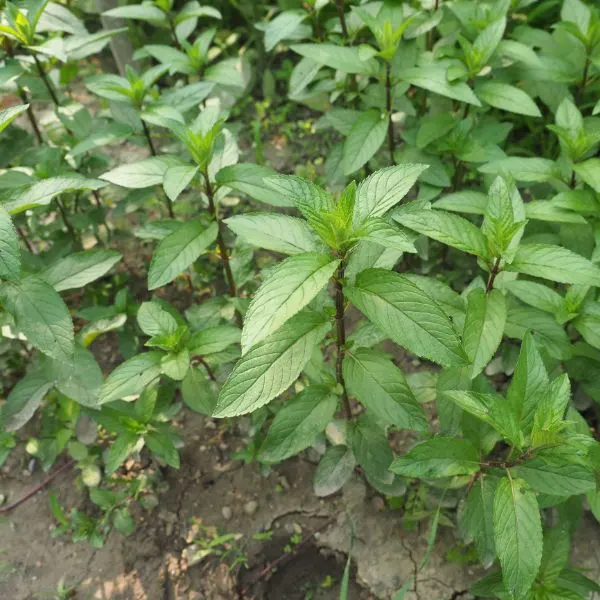
- Botanical name: Mentha × piperita
- Sun Requirements: Full sun
- Soil Type: Rich, Well-drained, and loose soil
Planting peppermint next to your squash will bring that sharp, signature scent, and a whole lot of other perks that can really come in handy. Starting off, the low ground cover will help to keep weeds at bay, while the yummy peppermint scent will attract ladybugs and other beneficial bugs to keep the pest away from the mint and your summer squash.
The scent of the peppermint also repels a pretty wide range of insects, such as ants, fleas, beetles, and moths, although you will want to keep an eye on it to ensure that your mint doesn’t spread anywhere that you don’t want it to go. Provided that you keep it in check, it makes a solid companion planting option for your summer squash!
3. Lemon Balm
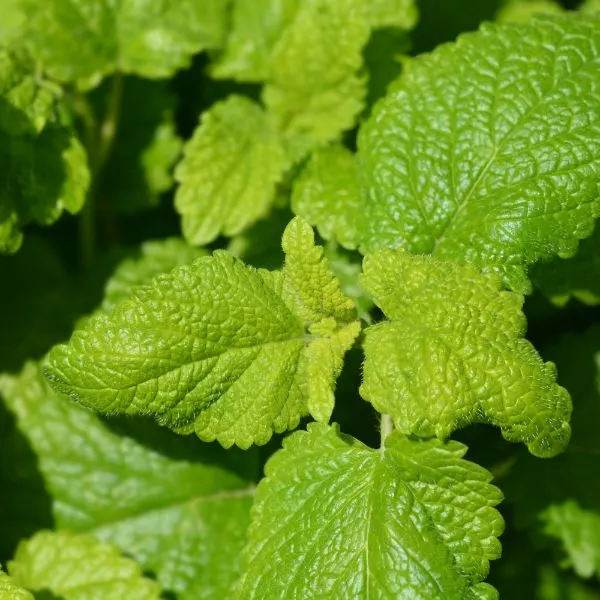
- Botanical name: Melissa officinalis
- Sun Requirements: Full sun
- Soil Type: Well-drained, slightly sandy soil
Lemon balm is our next companion planting option for summer squash and if you haven’t smelled it before, it’s an amazing combination of lemon scent with just the right hint of mint! This medicinal herb’s scent will attract lovely butterflies and it can also repel mosquitoes, gnats, and a handful of other small pests that might otherwise get at your squash.
Aside from growing well with your summer squash, lemon balm is also one of those plants that you can harvest a little of throughout the year, and makes a great substitute for lemon peel in your recipes. All in all, it’s a great companion plant option that you can get a lot of practical use from!
4. Chamomile
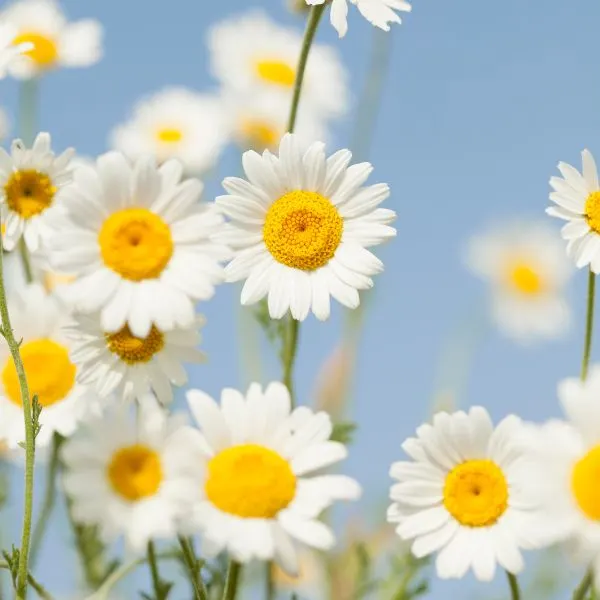
- Botanical name: Matricaria chamomilla
- Sun Requirements: Full sun
- Soil Type: Fertile, well-draining loam or sandy loam
If you’ve never had fresh chamomile tea, then you are doing yourself a disservice. The fresh, dried flowers really taste so much better than those packets you get at the store and as it turns out, this plant is a stellar companion option for your summer squash.
Starting off, if you live somewhere with brutal summers, chamomile can provide just enough shade to make it bearable for your squash, while that intoxicating scent will lure honeybees, predatory wasps, ladybugs, and hoverflies, so you’ll have both pollination and pest control covered.
As far as repelling properties, chamomile only has a few, but they’re pretty good ones . This plant will help to keep away ticks, mosquitoes, and pesky flies, and if the stories are true about it, then it may even improve the flavor of your summer squash. Give it a try and see what you think – it’s a great addition to any garden and definitely gets along well with your squash.
5. Marjoram
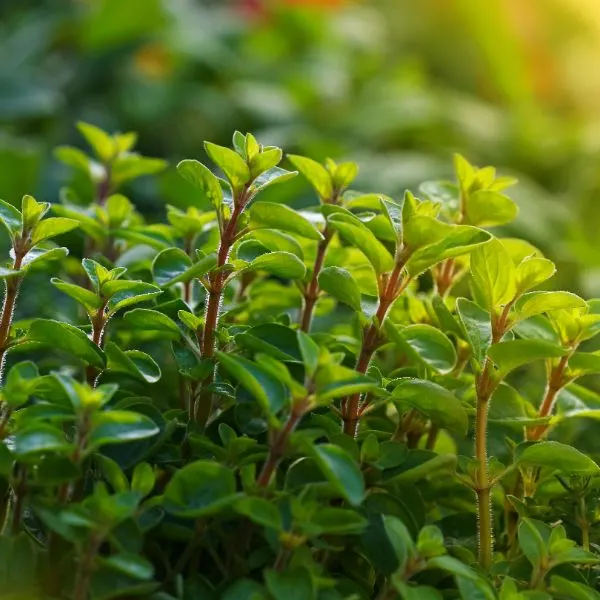
- Botanical name: Origanum majorana
- Sun Requirements: Full sun
- Soil Type: Well-drained, sandy or loamy soil, either slightly alkaline or slightly acidic is best
If you’ve never tasted sweet marjoram before, then it’s definitely something that you should try some time! Rather like a sweet oregano, it’s great in salads and with meat dishes, and it’s also great to grow with summer squash. Planted close by, this sweet-smelling herb can help to repel those pesky whiteflies, which is a pretty good perk from the get-go.
It is also believed to improve the flavor of your squash, and while we can’t attest to that, we CAN say that the lovely purple flowers will attract pollinators that can help to ensure you get a better squash yield. It’s a pretty and practical companion planting option and well-worth trying out in your garden!
Healthy Veggies and Delicious fruits
6. Radishes
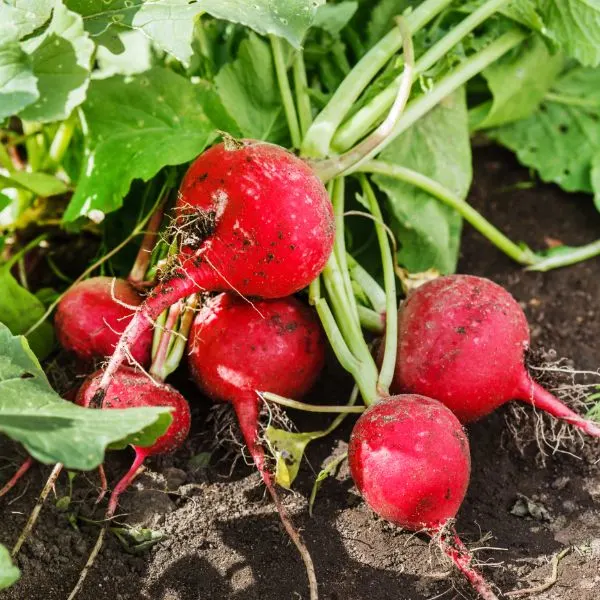
- Botanical name: Raphanus sativus
- Sun Requirements: Full sun
- Soil Type: Sandy, well-drained, and light soils
If you like radishes, then you might try planting them with your summer squash sometime.., it’s a pretty darned good pairing! Radishes are pretty tough and can be harvested in around 20 days, so you get a quick return from them, but they’ll also help to lure flea beetles and squash vine borers away from your summer squash, as well.
Aside from this, that quick turnaround time tills up the soil quite nicely and your squash will take good advantage of the thoughtfully-prepared space. As such, these two are quite the good companions if your squash could use a roomy that’s more than happy to pull its own weight!
7. Peas
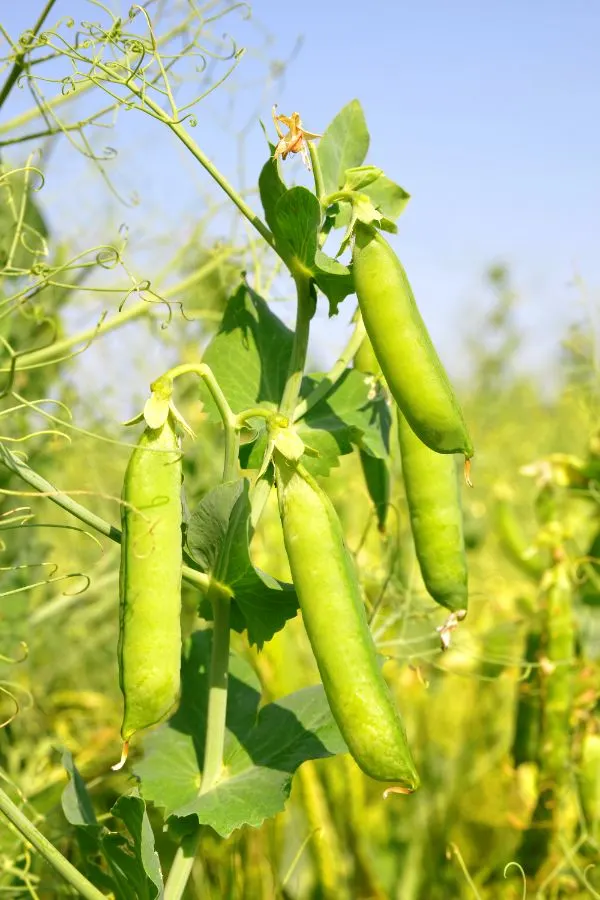
- Botanical name: Pisum sativum
- Sun Requirements: Full sun
- Soil Type: Fertile, well-draining, loamy soil
Peas are often used instead of beans in the famous ‘three sisters’ companion planting of squash, pole beans, and corn. On its own, however, it still makes a great companion plant for your summer squash that can really improve your yield.
The trick to it is the nitrogen that the peas will produce, which your squash will notice and put to good use. You’ll get bigger summer squash and the soil will be in much better shape than it would have if you’d chosen a more resource-intensive plant. Not a bad pairing at all, we think!
8. Okra
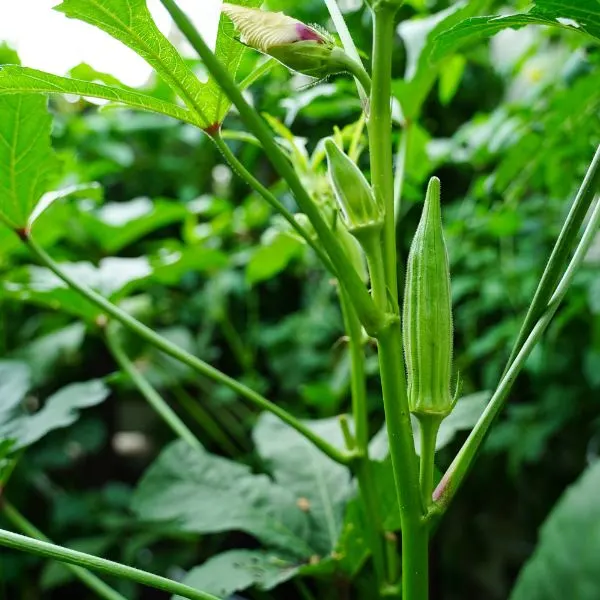
- Botanical name: Abelmoschus esculentus
- Sun Requirements: Full sun
- Soil Type: Rich, sandy, and well-drained soil, pH 5.8 To 6.8
Fresh okra is a wonderful treat to have in your garden and we’ve got good news for you – it really plays well with summer squash. That’s because while okra is tasty to us, silver whiteflies really can’t seem to stand the stuff.
Planted close by to your summer squash, it will help to keep the whiteflies away and without their interference, you might just be very happy when harvest time arrives!
9. Chives
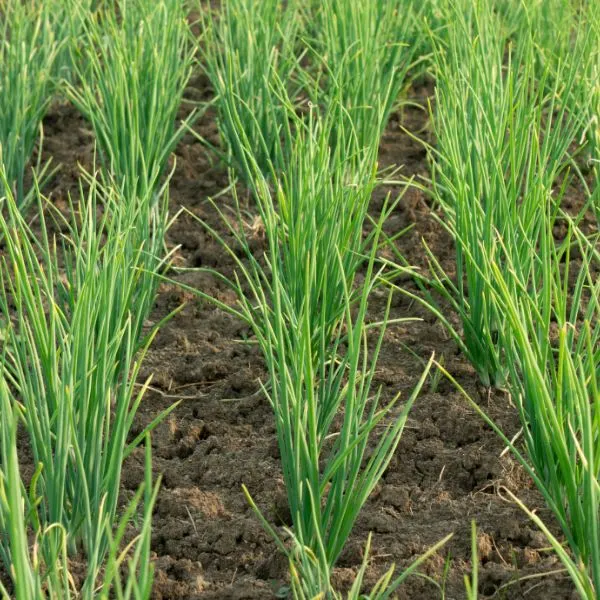
- Botanical name: Allium schoenoprasum
- Sun Requirements: Full sun
- Soil Type: Fertile, moist, well-drained soil
Chives are a common addition to many a garden, as there’s nothing quite like that compact, sharp zing of flavor that they can bring to your favorite dishes. As it turns out, it’s also nice to have as a companion for your squash and we’ll tell you why.
Chives, being from the allium family, will repel quite a lot of pests, including aphids and in some cases, even deer. They won’t affect the taste of your squash and you’ll definitely notice their signature smell, but the benefits for your summer squash definitely fall into the category of ‘solid’.
10. Blue Hubbard squash
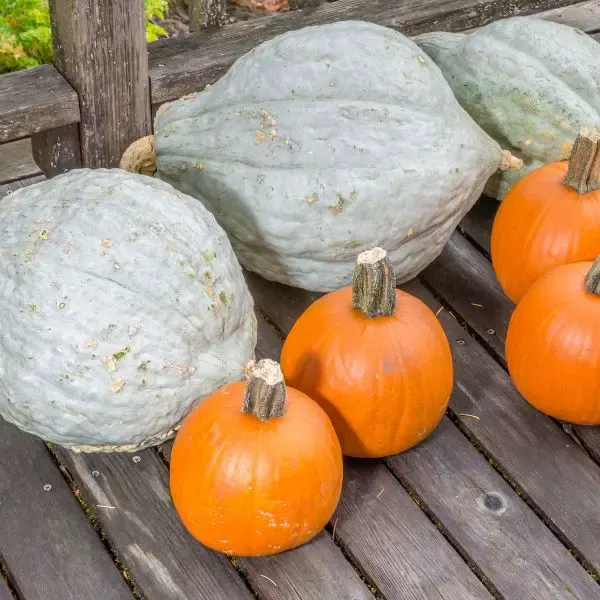
- Botanical name: Cucurbita maxima
- Sun Requirements: Full sun
- Soil Type: Organically rich, well-draining loam
Sometimes the best way to protect your summer squash is to simply give the pests what they want in the form of a trap plant. For this purpose, Blue Hubbard Squash is a sneaky, but very effective companion planting option.
These large, tough-skinned winter squashes are quite sweet to the taste, so planting them near your zucchini or other summer squashes will usually lure the worst of the pests away and since Blue Hubbard squashes get pretty enormous, this ‘trap companion’ should keep them busy until you can safely harvest your summer squash! It’s a little on the sneaky side, but companion planting is all about strategy and this particular one REALLY works.
11. Garlic
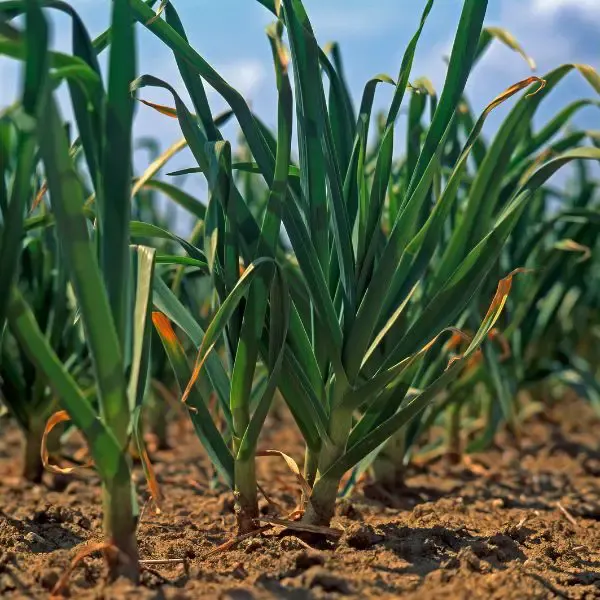
- Botanical name: Allium sativum
- Sun Requirements: Full sun
- Soil Type: Loamy and well-drained, with lots of organic matter
Unless you are allergic to it or secretly a vampire, then you’re probably growing garlic in your garden right NOW. It’s really an essential taste for so many dishes around the world that the joys of having your own fresh crop really make it worthwhile. So, why not plant it with your summer squash?
Garlic is great for repelling pests, both with insects and animals that might wander into your garden. As an added bonus, it has antifungal qualities that can get into the soil and help to ensure that both your garlic and squash will grow up to be happy and healthy. Granted, the scent does take a little getting used to but don’t worry – it won’t affect the taste of your squash and this stinky companion option will work hard to earn its keep!
Ornamental additions
12. Nasturtiums
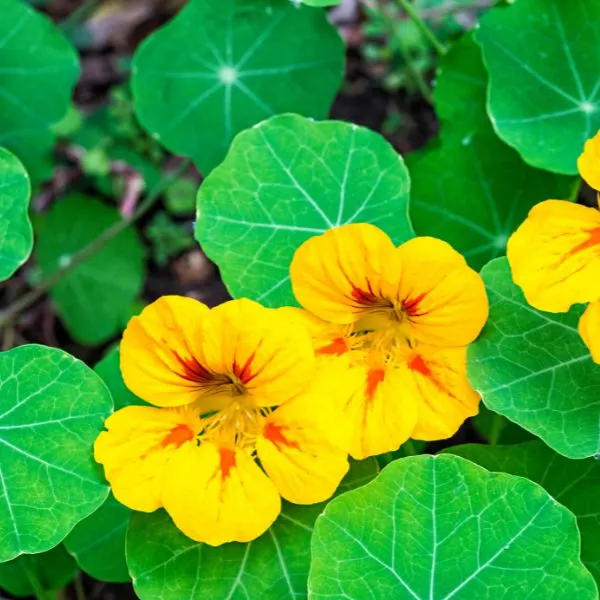
- Botanical name: Tropaeolum majus
- Sun Requirements: Full sun
- Soil Type: Fertile, well-drained soil
Nasturtiums can bring lovely yellow, orange, or cream-colored flowers to your garden, along with a little extra security for your squash that you’ll appreciate come harvest time. Easy to raise, the nasturtium will lure aphids, flea beetles, and squash vine borers away from your zucchini and other summer squashes quite nicely.
What’s more, every part of nasturtium is edible and the flowers themselves make a nice addition to your salads and while we can’t confirm it from experience, many gardeners say that growing nasturtium with your squash will enhance its flavor! As it brings plenty of perks to the table already, it definitely can’t hurt to test that ‘old gardener’s tale’ to get to the bottom of it on your own.
13. Borage
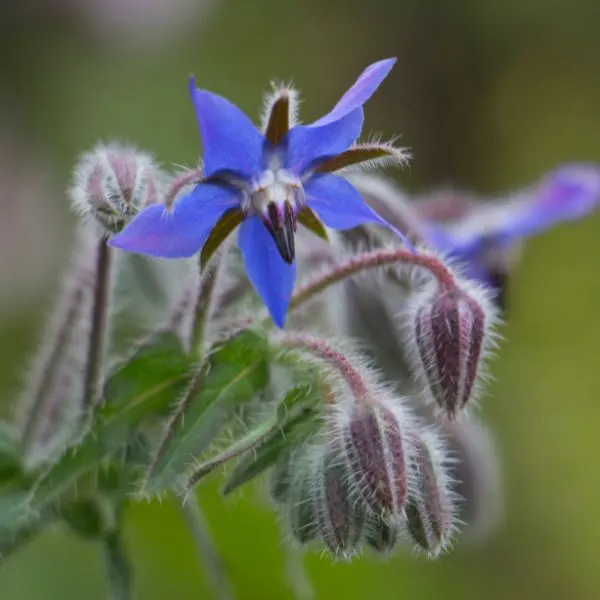
- Botanical name: Borago officinalis
- Sun Requirements: Full sun or partial shade
- Soil Type: Will grow even in poor soil, but thrives in well-drained, moist soils
Borage is another ornamental option that’s both beautiful and quite handy to have around your summer squash. For starters, it will attract pollinators who love its tiny blue flowers, and this will help to ensure that you get more squash instead of simply more vining flowers. While it’s luring over bees and butterflies to help with pollination, it will also attract ladybugs and predatory wasps, who can help by munching on any pests that might be trying to snack on your squash.
Borage also repels cabbage worms and cucumber beetles and as an added bonus, it makes for a lovely and decorative edible addition to salads. All in all, not a bad companion planting option for summer squash in the slightest!
14. Marigolds
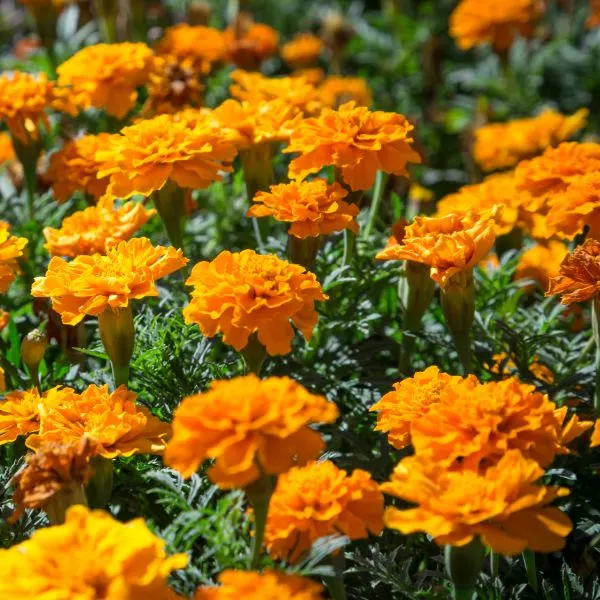
- Botanical name: Tagetes
- Sun Requirements: Full sun
- Soil Type: Well-drained, Loamy soil
Marigolds can add a bit of yellow or golden color to your garden and help out your summer squash in the bargain. It will start off by bringing bees into your garden to help ensure that you get a good yield from your squash, and deep in the soil it will work another kind of magic that you’ll definitely like.
Root nematodes can be problematic, but marigolds secrete a chemical that can actually kill them, making the soil around them safe for the marigolds and your summer squash. It’s a pretty pairing that definitely pays off, and well-worth trying in your garden.
15. Sweet alyssum
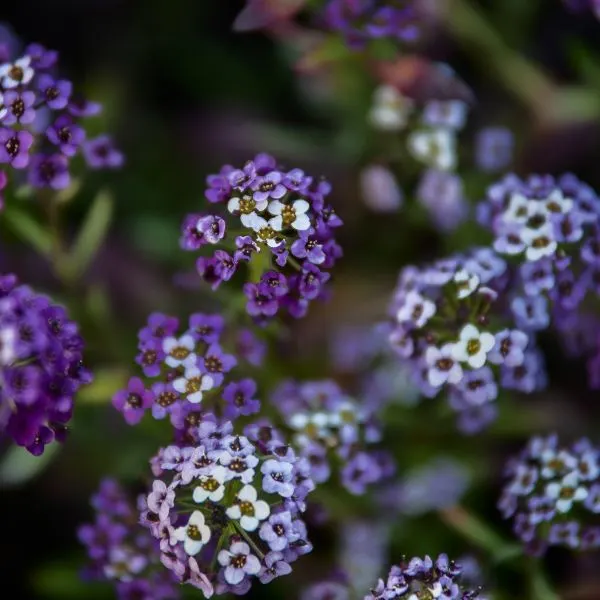
- Botanical name: Lobularia maritima
- Sun Requirements: Full sun to partial shade
- Soil Type: Well-drained soil, pH 6.0 to 7.0
Our final ornamental lovely is sweet alyssum and this plant can really come in handy for your squash when it’s hot out, as it provides some lovely ground cover for a bit of much-needed shade. Planted just under and around your zucchini, it will serve this purpose well and also help to keep weeds from coming in and choking your summer squash.
Aside from its ground-cover perks, the lovely purple and white flowers will attract predatory and parasitic wasps, which will chow down on pests that might otherwise eat your squash, and it can also to deter the assault of aphids, thrips, leaf miners, and those annoying whiteflies. As a companion for your squash, this alyssum is very sweet indeed!
The worst companion plants for Summer Squashes
We’ve reviewed some of the best companion plants for summer squashes, so now it’s time to flip the coin and share with you some of the WORST. Each of the plants listed below makes a poor roommate for summer squash and we’ll tell you a little about the ‘why’ of it to help you avoid the pitfalls of these ill-fated pairings. Let’s take a look!
1. Potatoes
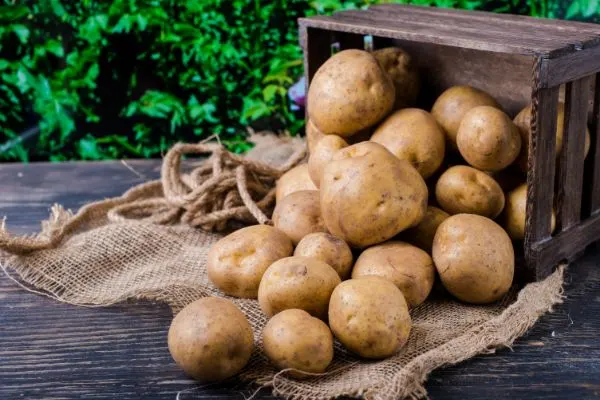
Potatoes can be pretty hard on the soil. They take months to grow, for one thing, and for another, since they are root vegetables they tend to get at the nutrients a little faster than a lot of aboveground veggies. With Summer squash, this won’t go well for either plant, but as the squash competes with the potatoes for water and other nutrients it will eventually win.
You’ll end up with no or very poor potato yields and your summer squash won’t be as healthy as it could have been with another pairing. It’s best to just mark these two down as ‘bad roommates’ and keep them separated.
2. Cucumbers
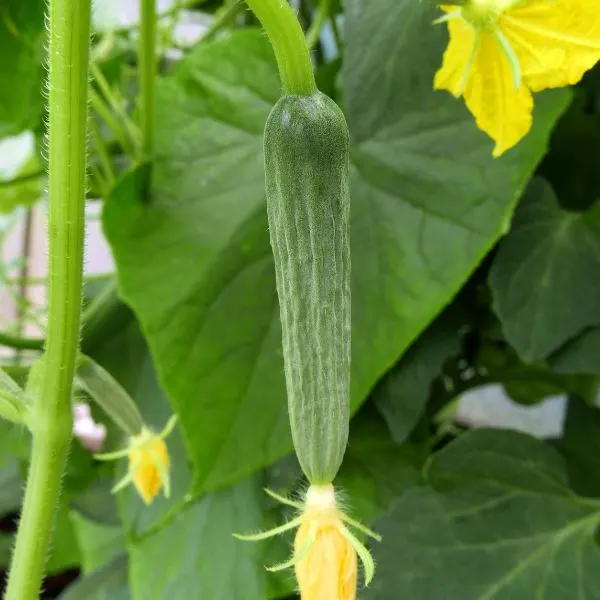
Summer squashes like zucchini will not play well with cucumbers and it all boils down to the vines. Both cucumbers and summer squash are pretty aggressive at getting what they need from the soil and the sun, and their questing vines are quite likely to become a bit tangled in the process and neither plant will be very happy!
3. Pumpkins
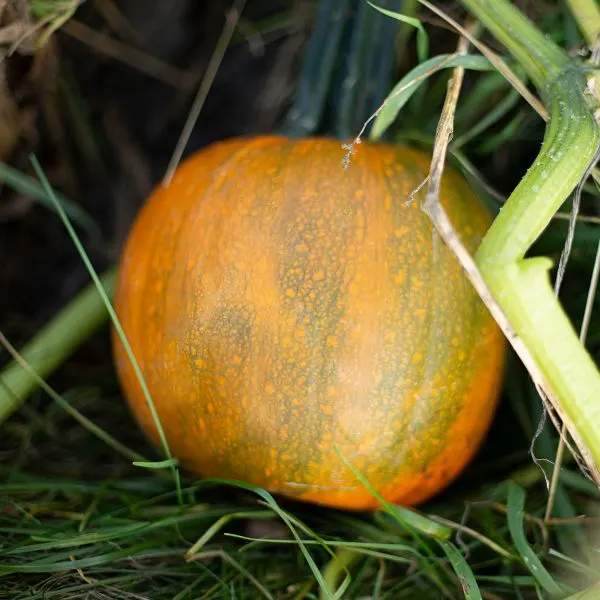
Pumpkins and summer squash are another companion planting nightmare, with the same scenario essentially that you get with cucumbers. Both plants will send out their vines, getting fairly tangled in the process, and they’ll fight like rabid dogs over the available resources.
Both your pumpkin and squash will be all the poorer for it, so it’s best that they each have their own spot somewhere away from the other.
4. Black-eyed peas
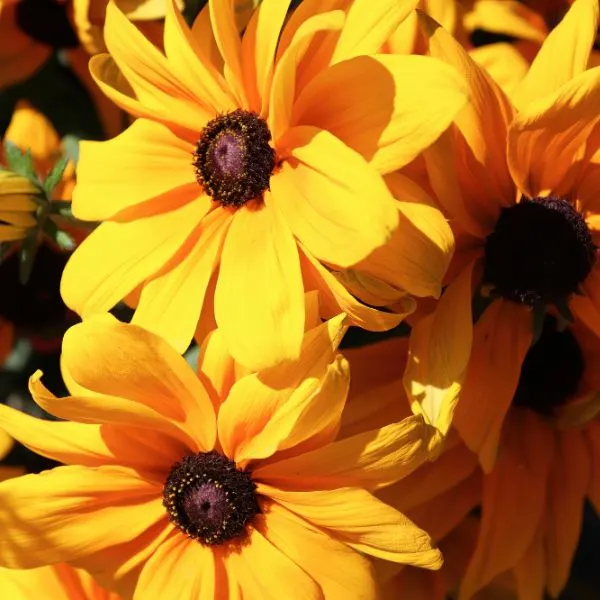
Black-eyed peas can attract a lot of beneficial insects, such as pirate bugs and parasitic wasps, so one would think that they would be a great companion for squash but that’s actually not the case. The problem is that black-eyed peas also tend to attract a very large amount of aphids.
Some companion plants won’t mind this, but with squash and too many aphids creating honeydew excretions then you have a recipe for mold and other fungus issues. As such, keep your black-eyed peas and summer squash in their own sides of the garden – you won’t like what happens if you don’t!
5. Fennel
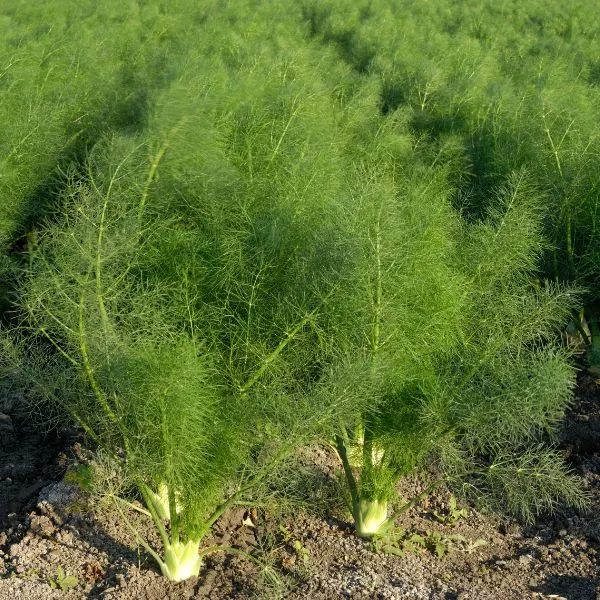
Fennel, like many other plants that are considered ‘invasive’, has a habit of secreting chemicals into the soil that help the fennel grow, but also help to establish their dominance in the area. This can harm or even kill other plants that come in contact with it, and with squash the fennel will definitely stunt their growth. It’s just not a good match at all and as it’s easy to avoid, just keep your fennel far away from squash and any other plants that you haven’t researched for companion planting with it.
FAQs
It’s just about time for us to call it a day, but before we go we have collected a few frequently asked questions about companion plants for summer squash that we hope you will find useful. Let’s take a peek and you can see what you think!
What are some other bad companion plants for summer squash?
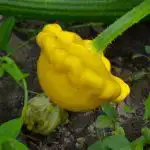
Some other companion plant options to avoid with your summer squash are melons, sweet potatoes, and winter squashes. Typically the problem with these is that all of the plants involved are quite aggressive and with all those vines and tendrils, you’re in for a resource battle and you’ll have some pretty tangled, poorly growing companions at best.
As such, it’s better to avoid any other vining or resource-aggressive options that might stunt your squash.
What companion plants are best for summer squash?

The two best companions for summer squash are pole beans and corn, which creates the ‘3 sisters’ companion planting that was discovered by early Native Americans. The squash provides useful ground cover to help keep away weeds, while the corn helps to trellis the beans, and the beans spike nitrogen into the soil that benefits all of the plants involved.
It’s a fantastic combination and worth trying on your own to witness it firsthand!
Can I grow tomatoes with my summer squash?

While the perks are minimal, yes, you can grow tomatoes with your summer squash and as their growing requirements are quite similar, they’ll both be easy to maintain in the same spot. As a small bonus, the tomato plants can help to keep the weeds in check although you should still keep an eye on this pair just to be sure.
In Conclusion
In today’s article, we’ve taken a look at 15 of the best companion plants for summer squash, as well as 5 of the worst, and you’ve definitely got some excellent options. Companions such as garlic can repel a lot of pests, while also adding antifungal properties to the soil. Nasturtiums can bring a little beauty, while also luring in helpful pollinators and even acting as a trap plant for aphids and other pests.
It’s easy to see the benefits, so now it’s up to you to pick out a favorite and try a little companion planting on your own. With a little luck and those companion planting perks, courtesy of Mother Nature, you’ll see an enormous difference come harvest time.
We’d like to thank you for reading and we wish you the best of luck with companion planting at home!
More companion plants
